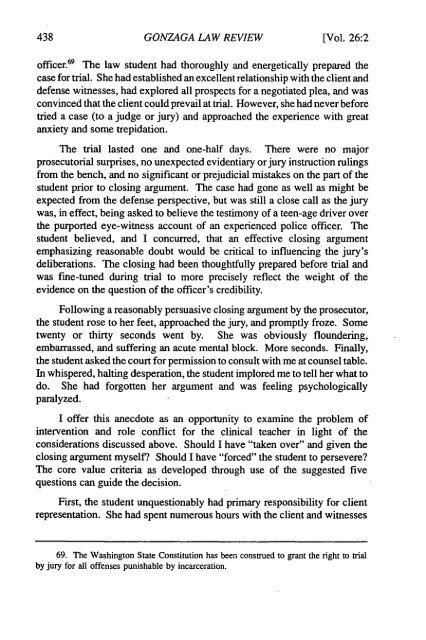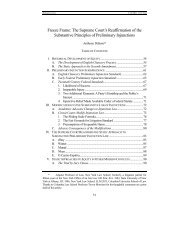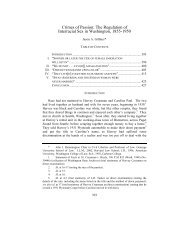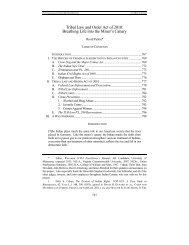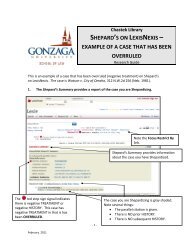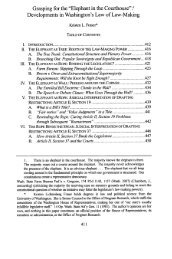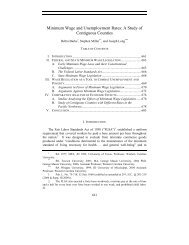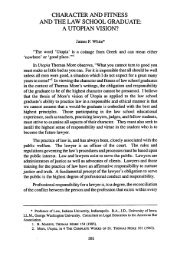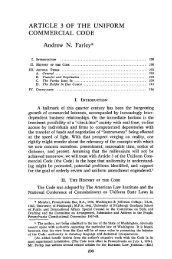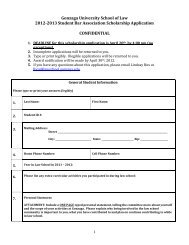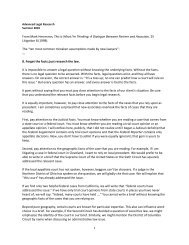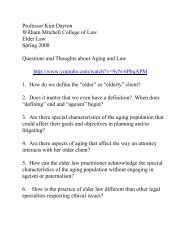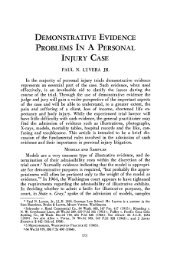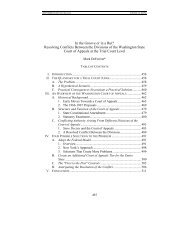professional responsibility, student practice, and the clinical
professional responsibility, student practice, and the clinical
professional responsibility, student practice, and the clinical
You also want an ePaper? Increase the reach of your titles
YUMPU automatically turns print PDFs into web optimized ePapers that Google loves.
GONZAGA LAW REVIEW<br />
[Vol. 26:2<br />
officer. 69 The law <strong>student</strong> had thoroughly <strong>and</strong> energetically prepared <strong>the</strong><br />
case for trial. She had established an excellent relationship with <strong>the</strong> client <strong>and</strong><br />
defense witnesses, had explored all prospects for a negotiated plea, <strong>and</strong> was<br />
convinced that <strong>the</strong> client could prevail at trial. However, she had never before<br />
tried a case (to a judge or jury) <strong>and</strong> approached <strong>the</strong> experience with great<br />
anxiety <strong>and</strong> some trepidation.<br />
The trial lasted one <strong>and</strong> one-half days. There were no major<br />
prosecutorial surprises, no unexpected evidentiary or jury instruction rulings<br />
from <strong>the</strong> bench, <strong>and</strong> no significant or prejudicial mistakes on <strong>the</strong> part of <strong>the</strong><br />
<strong>student</strong> prior to closing argument. The case had gone as well as might be<br />
expected from <strong>the</strong> defense perspective, but was still a close call as <strong>the</strong> jury<br />
was, in effect, being asked to believe <strong>the</strong> testimony of a teen-age driver over<br />
<strong>the</strong> purported eye-witness account of an experienced police officer. The<br />
<strong>student</strong> believed, <strong>and</strong> I concurred, that an effective closing argument<br />
emphasizing reasonable doubt would be critical to influencing <strong>the</strong> jury's<br />
deliberations. The closing had been thoughtfully prepared before trial <strong>and</strong><br />
was fime-tuned during trial to more precisely reflect <strong>the</strong> weight of <strong>the</strong><br />
evidence on <strong>the</strong> question of <strong>the</strong> officer's credibility.<br />
Following a reasonably persuasive closing argument by <strong>the</strong> prosecutor,<br />
<strong>the</strong> <strong>student</strong> rose to her feet, approached <strong>the</strong> jury, <strong>and</strong> promptly froze. Some<br />
twenty or thirty seconds went by. She was obviously floundering,<br />
embarrassed, <strong>and</strong> suffering an acute mental block. More seconds. Finally,<br />
<strong>the</strong> <strong>student</strong> asked <strong>the</strong> court for permission to consult with me at counsel table.<br />
In whispered, halting desperation, <strong>the</strong> <strong>student</strong> implored me to tell her what to<br />
do. She had forgotten her argument <strong>and</strong> was feeling psychologically<br />
paralyzed.<br />
I offer this anecdote as an opportunity to examine <strong>the</strong> problem of<br />
intervention <strong>and</strong> role conflict for <strong>the</strong> <strong>clinical</strong> teacher in light of <strong>the</strong><br />
considerations discussed above. Should I have "taken over" <strong>and</strong> given <strong>the</strong><br />
closing argument myself? Should I have "forced" <strong>the</strong> <strong>student</strong> to persevere?<br />
The core value criteria as developed through use of <strong>the</strong> suggested five<br />
questions can guide <strong>the</strong> decision.<br />
First, <strong>the</strong> <strong>student</strong> unquestionably had primary <strong>responsibility</strong> for client<br />
representation. She had spent numerous hours with <strong>the</strong> client <strong>and</strong> witnesses<br />
69. The Washington State Constitution has been construed to grant <strong>the</strong> right to trial<br />
by jury for all offenses punishable by incarceration.


